To strengthen the development of the FinTech discipline and further enhance the quality of FinTech talent cultivation, the Economics Department collaborated with Beijing Institute of Technology to host the "FinTech Discipline Construction Practice Exchange Conference and 2025 FinTech Virtual Teaching and Research Office Workshop" organized by the Ministry of Education's FinTech Virtual Teaching and Research Office on October 25–26, 2025. Professor Meng Fanchen, Director of the Economics Department, presided over the opening ceremony. Experts and scholars from renowned domestic universities such as Central University of Finance and Economics, Southern University of Science and Technology, Beijing Institute of Technology, Fudan University, and Shenzhen University exchanged research findings and talent cultivation experiences under the theme "AI Empowerment · Connotation Innovation · Teaching and Research Upgrade." They also engaged in in-depth discussions on topics such as the FinTech talent cultivation system and curriculum design and development. Nearly 200 representatives from over 100 universities nationwide attended the conference.
President Professor Li Hezhang attended the opening ceremony. In his speech, President Li extended a warm welcome and heartfelt gratitude to the leaders, experts, and scholars from universities across the country. He introduced the achievements of Shenzhen MSU-BIT University in discipline construction and talent cultivation, highlighting the university's dual-driven "Technology + Economics" discipline system framework and the latest progress in FinTech discipline development. He emphasized that the university will continue to leverage open education and platform-based collaboration models to serve the digital economy and the development of the Guangdong-Hong Kong-Macao Greater Bay Area.
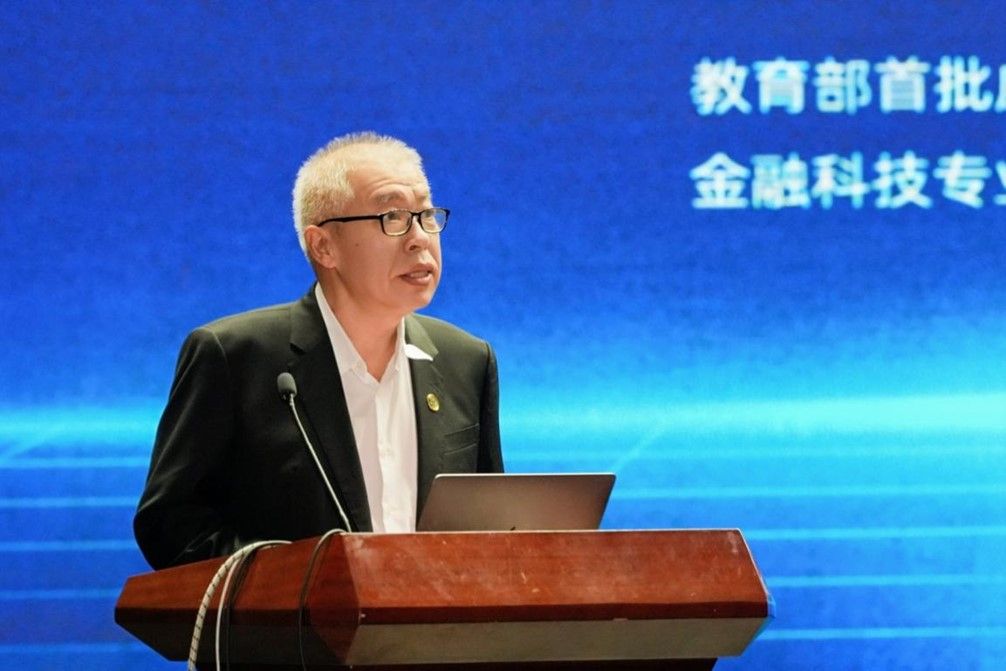
Professor Li Jianjun, Vice President of Central University of Finance and Economics and Head of the Ministry of Education's FinTech Virtual Teaching and Research Office, delivered a speech on behalf of the organizers. In his address, Professor Li expressed gratitude to the Economics Department of Shenzhen MSU-BIT University for their efforts in organizing the conference and extended sincere congratulations for the achievements in the development of applied economics and FinTech discipline construction at the university. He emphasized that the virtual teaching and research office will focus on three key areas moving forward: "deepening AI empowerment, concentrating on connotation innovation, and advancing teaching and research upgrades." By leveraging the virtual teaching and research office as a hub, it aims to enhance cross-institutional resource integration and collaborative education effectiveness.
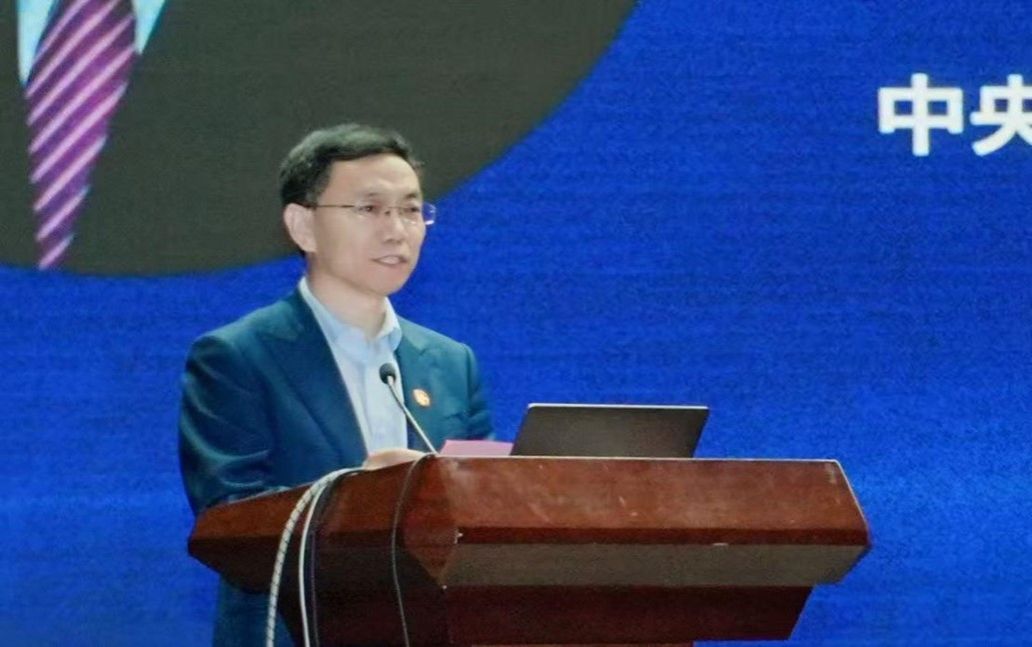
Professor Peng Yuchao, Vice Dean of the School of Finance at Central University of Finance and Economics, summarized the achievements of the Ministry of Education's FinTech Virtual Teaching and Research Office in 2024, covering areas such as FinTech discipline system construction and development, teaching resource sharing mechanisms, specialized textbook development, and teaching innovation. He also introduced the work plan for 2025–2026.
To recognize the accomplishments of universities nationwide in FinTech discipline construction, the conference honored five institutions—Dongbei University of Finance and Economics, Shanghai University of Finance and Economics, Wuhan University of Technology, Guangdong University of Finance, and Beijing FinTech College—as "Exemplary Institutions for Teaching Innovation in the FinTech Virtual Teaching and Research Office." Additionally, 14 universities, including Shenzhen MSU-BIT University, South China University of Technology, and Xi'an International Studies University, were recognized as "Outstanding Collaborative Institutions."
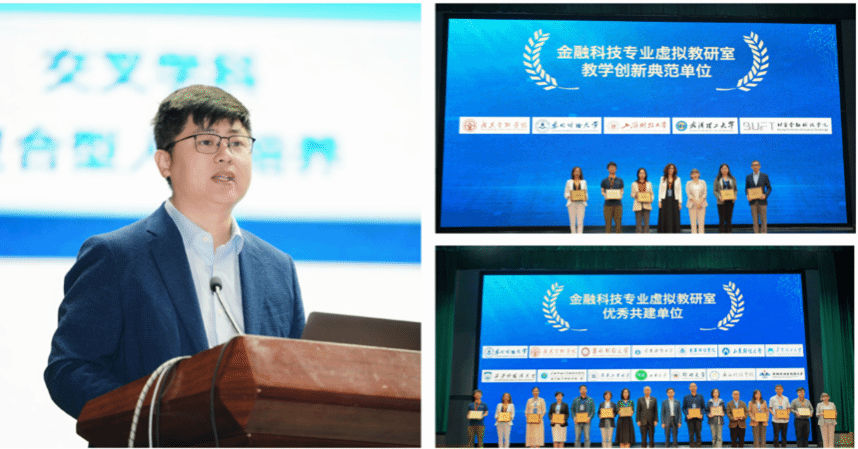
Professor Li Jian, a distinguished professor at the School of Finance of Central University of Finance and Economics and a nationally renowned educator, and Professor Li Zhongfei, Chair Professor at Southern University of Science and Technology, member of the Academic Degrees Committee of the State Council’s Discipline Evaluation Group, and recipient of the National Science Fund for Distinguished Young Scholars, delivered keynote speeches at the conference.
Professor Li Jian’s speech, titled "Comprehensively Implementing Xi Jinping’s Economic Thought and Striving to Build an Independent Knowledge System for Chinese Finance," provided an in-depth analysis of the era’s significance, core pathways, and practical requirements for constructing China’s independent financial knowledge system, offering theoretical guidance for FinTech discipline development.
Professor Li Zhongfei’s speech, titled "Opportunities and Challenges Brought by AI Large Models to the Financial Industry and Financial Education," examined the opportunities and challenges arising from advancements in artificial intelligence and their impact on the evolution of FinTech disciplines.
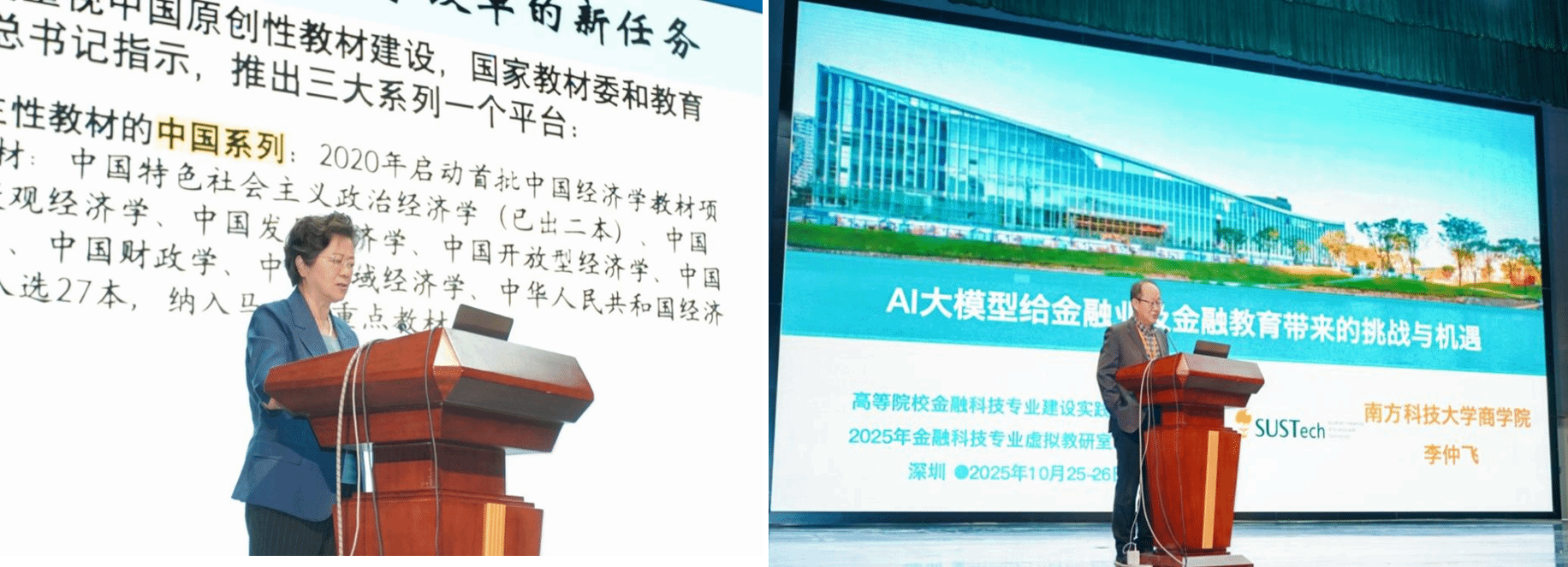
Professor Wang Zhaohua, Dean of the School of Economics at Beijing Institute of Technology, recipient of the National Science Fund for Distinguished Young Scholars, and Distinguished Professor under the Ministry of Education's "Chang Jiang Scholars Program," along with Professor Chen Haiqiang, Dean of the School of FinTech at Shenzhen University, and Professor Zhou Guangyou, Director of the Digital Finance Research Center at the School of Economics of Fudan University, delivered thematic reports.
Their respective topics were: "Digital-Intelligent Integration and Innovative Teaching: Virtual Simulation Practices and Innovations in FinTech"、"Industry-Education Integration, Cross-Disciplinary Empowerment, and Global Synergy: Exploration and Practice in Cultivating FinTech Innovation and Entrepreneurship Talent"、"Competition and Substitution Between Stablecoins and CBDCs—With Implications for RMB Internationalization".
They elaborated on the application scenarios of virtual simulation technology in FinTech education (such as quantitative trading simulations and risk management training), its innovative outcomes, and its role in enhancing students' practical skills. They also systematically introduced the logic and effectiveness of building a FinTech innovation and entrepreneurship talent cultivation system through collaboration among "universities + enterprises + international resources." Additionally, they conducted an in-depth analysis of the competitive relationship and substitution pathways between private stablecoins and Central Bank Digital Currencies (CBDCs), discussing their potential impact on the internationalization of the RMB.

This year's conference also featured a practical exchange session and a roundtable forum. Three co-construction units of the FinTech Virtual Teaching and Research Office—Shanghai University of Finance and Economics, Zhilian Technology, and Wuhan University of Technology—engaged in practical exchanges on topics such as: "AI Empowering Innovation in Financial Curriculum Development and Experimental Resource Construction", "Educational Objectives and Teaching Practices for 'Finance + AI'", "Exploration and Practice of Interdisciplinary FinTech Talent Cultivation Models in Science and Engineering Universities Under the 'New Liberal Arts' Framework". They shared their successful experiences, fostering cross-regional flow and mutual enhancement of high-quality resources.

The conference also included a practical exchange session and a roundtable forum. Three co-construction units of the FinTech Virtual Teaching and Research Office - Shanghai University of Finance and Economics, Zhilian Technology, and Wuhan University of Technology - conducted practical exchanges around topics such as "AI Empowering Financial Professional Course Construction and Experimental Resource Construction Innovation", "'Finance+AI' Education's Training Objectives and Teaching Practice", and "Exploration and Practice of Interdisciplinary FinTech Talent Cultivation Models in Science and Engineering Universities Under the 'New Liberal Arts' Background". They shared their successful experiences, promoting cross-regional flow and common improvement of high-quality resources.
Distinguished guests including He Jia, Vice Dean of the School of Finance at Nankai University, Li Qinying, Vice Dean of the School of Business at Zhengzhou University, Wang Xiaoyan, Director of the Experimental Teaching Center at Guangdong University of Finance, Wang Lan, Dean of the School of Finance at Chongqing Technology and Business University, Xia Yuejun, Head of the Digital RMB Innovation Laboratory (Shenzhen) at Agricultural Bank of China, Irina Nikitushkina, Russian Director of the Department of Economics at Shenzhen MSU-BIT University, and Zhang Lunke, Chief Internet Industry Analyst at Guosen Securities were invited to participate in the roundtable forum with the core theme of "University-University and University-Enterprise Collaboration in FinTech Curriculum Construction Driven by AI Capabilities". The discussion focused on discipline construction, industry-education-research integration mechanisms, and university-enterprise joint talent cultivation, proposing practical suggestions such as driving curriculum iteration with real business scenarios, jointly cultivating interdisciplinary talents through practice bases, and safeguarding teaching and research with data security and technology ethics.
Considering the regional characteristics of domestic universities, the conference set up a sub-forum on regional collaborative development of the FinTech Virtual Teaching and Research Office. Discussions were held on topics including "Demand for Teaching Model Construction and Intelligent Agent Applications in Finance Disciplines Within and Across Universities" and "Innovative Practice Exchange on FinTech Professional Curriculum Under Deep AI Empowerment". It clarified the promotion of resource coordination, standard co-construction and achievement mutual recognition with regional communities as units, enhancing collaborative governance and service capabilities to better serve regional economic and social development.
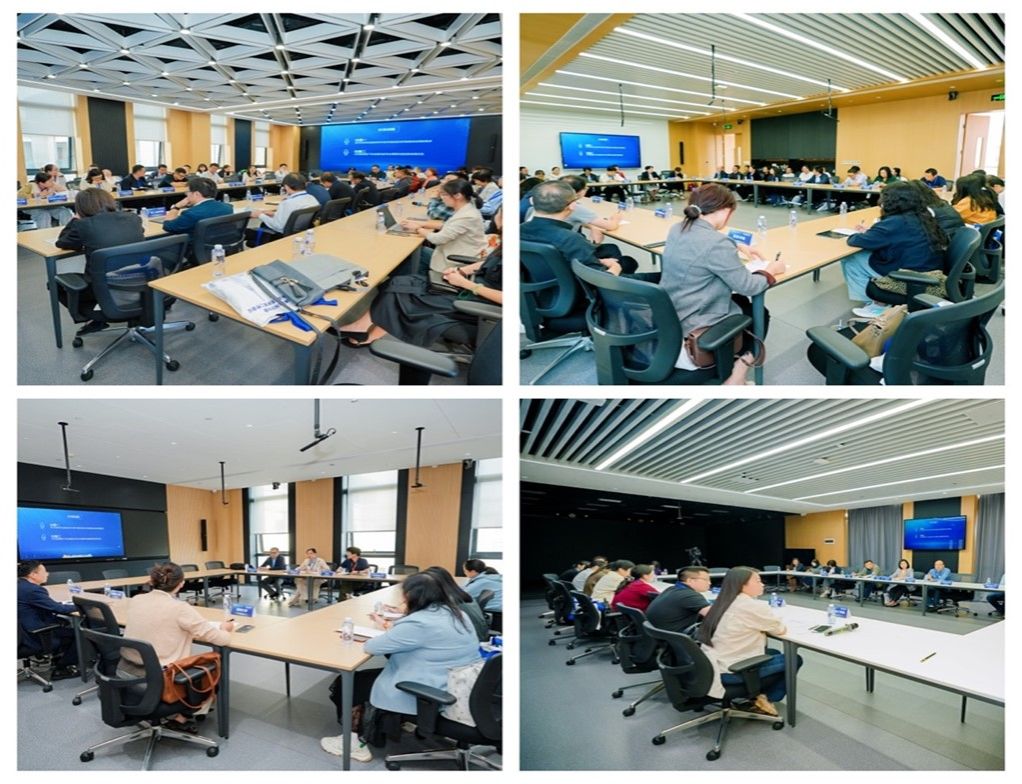
To enhance the talent cultivation level of the FinTech major, the conference also held a FinTech professional curriculum training program. Peng Yuchao, Vice Dean of the School of Finance at Central University of Finance and Economics and recipient of the National Youth Talent Award; Chen Ying from Shenzhen University's School of Economics and certified CFT FinTech trainer of the China Banking Association; and Professor Han Dongli from Central University of Finance and Economics' School of Finance and Executive Deputy Director of the National Engineering Research Center for Financial Security under the Ministry of Education, conducted faculty training focusing on high-quality courses, cutting-edge courses, and practical courses. They provided actionable teaching resources and methodologies tailored to frontline classrooms and practical training scenarios, directly improving the digital literacy and teaching-research capabilities of faculty members, thereby supporting teaching reforms and quality enhancement amid the digital and intelligent transformation of education.
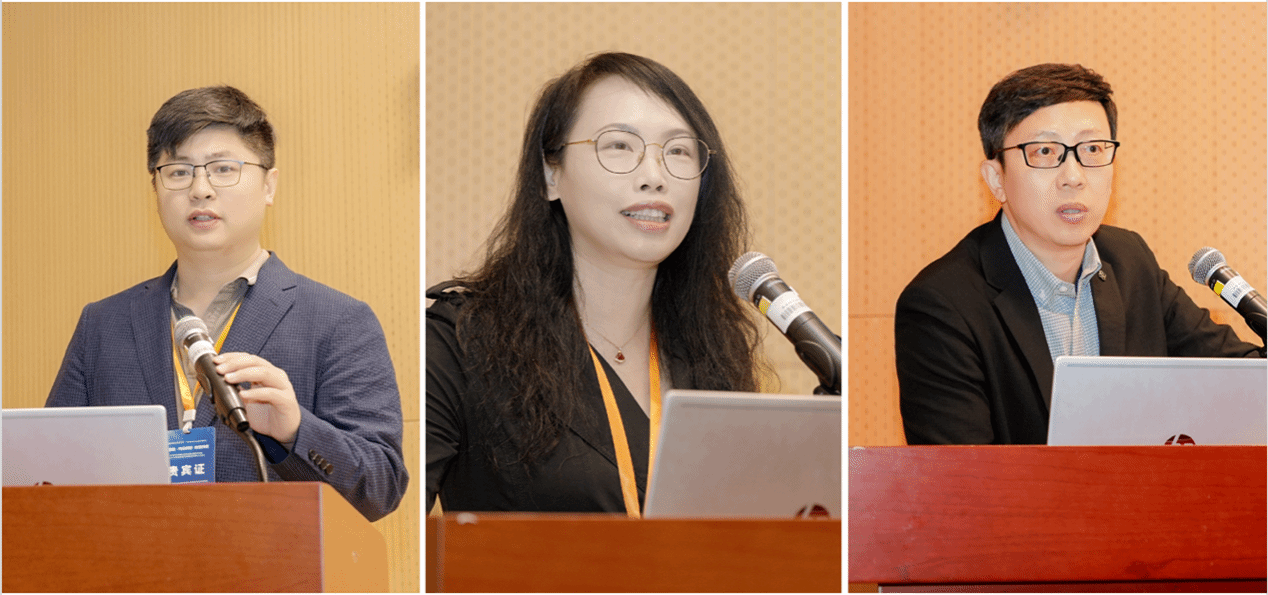
This conference brought together leading educational experts and industry elites in the field of FinTech in China. Centering on the theme of "AI Empowerment · Connotative Innovation · Teaching-Research Upgrade," it facilitated in-depth exchanges and collaborative discussions, laying a solid foundation for the establishment and high-quality development of a national FinTech professional construction community. The event holds significant importance in promoting the connotative development of the discipline and accelerating the integration of science-education and industry-education.
As one of the organizers, the Department of Economics at Shenzhen MSU-BIT University undertook this conference as an important initiative to implement the university's dual-driven disciplinary system construction goal of "Technology + Economics" and actively serve the national strategy of building China into a financial powerhouse. Moving forward, the Department of Economics will continue to integrate academic and industry resources, focusing on the "Five Key Areas" of Sci-Tech Finance, Green Finance, Inclusive Finance, Pension Finance, and Digital Finance. By leveraging digital empowerment and the convergence of science and education, it aims to enhance talent cultivation quality and innovation capabilities, contributing greater strength to the high-quality development of FinTech education and the construction of a financial and educational powerhouse.




